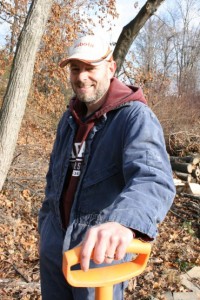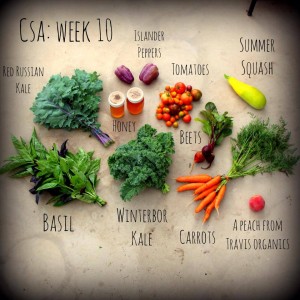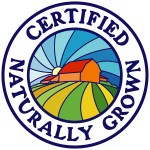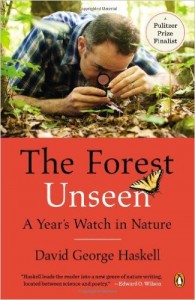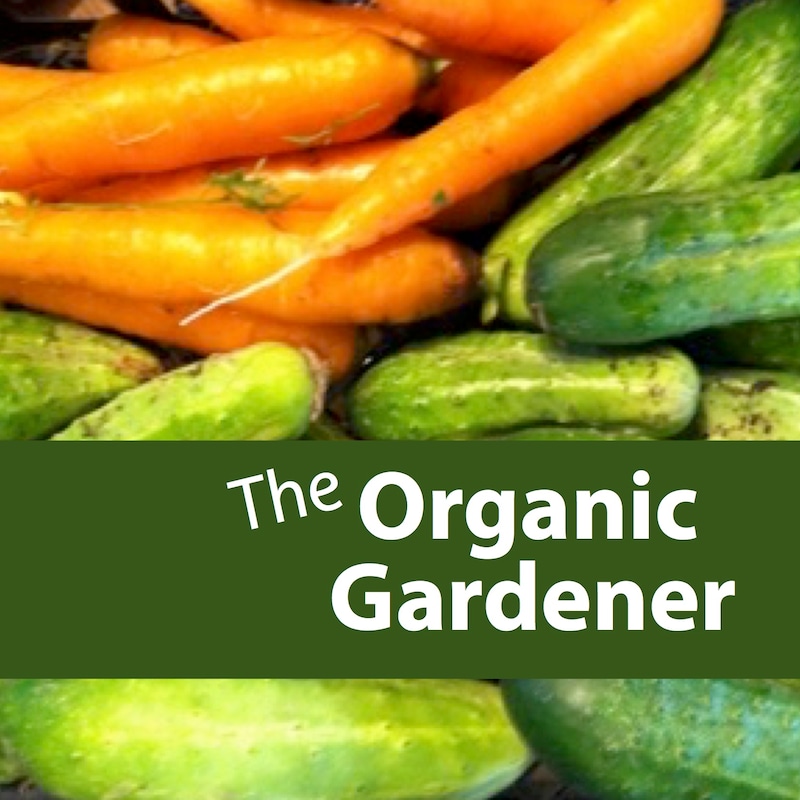
Shownotes
Amazing Heart Farm • Healing Work • Healthy Eating • Sustainable Agriculture
Elizabeth Weller is here to share her amazing and bountiful journey from a religion and philosophy major who danced between the two worlds of farming and social work finding a balance where she can help people nourish their bodies and heal their spirits. A new mom of a beautiful little girl this year she is helping at the student Painted Turtle Farm at Gettysburg College or helping with the CSA at her own Amazing Heart Farm where they work on building community through healing work, healthy eating and sustainable agriculture. She is also an active board member of the Certified Naturally Grown Program.
Tell us a little about yourself.
Well just a little background to start off with I received my Undergraduate Degree from Sarah Lawrence College in Bronxville, NY. There weren’t really an majors at Sarah Lawrence you were just encouraged to explore your interests and to find an area of study to concentrate on. My first year studies class was called the philosophy of religion. And in that class which was completely life changing and it was in that class that I was first introduced to the writings of Wendell Berry.
Wendell Berry is a farmer, and he’s also a teacher and writer and environmental activist and an advocate for local food economies. And his writings first interested me in farming, so then I took a year off from college between my sophomore and junior year. I wanted to do some traveling. I spent 6 months at the Rocky Mountain NAtional Park in Estes Park, Colorado. Then I spent a month at the Zen Mountain Monastery in Mount Tremper, New York, and then I went to Tasajara Zen Center in Carmel Valley in CA.
When I returned from that I met up with a friend who I’d met in Colorado. who was studying at Shepard College which is about 20 minutes from my home town it’s in Shepherdstown, West Virginia. I grew up in Wainsborough PA, small town in MD border. She told me about a local farmer who was recruiting students to get a tree farm and an apple orchard. She invited me to join them. And I did and I really enjoyed about growing food and being part of a business that provided food for the local community. But I think more importantly, I had a really powerful experience of the work on the farm of it’s rhythm and it’s physicality and the community built around it, it’s healing.
And it’s from that experience that I first became interested in farming as a therapeutic tool and spiritual practice.
So when I returned to Sarah Lawrence, I really focused my studies on these ideas, and I ended up writing a senior thesis, which was kind of an optional thing. And I focused in on what I call the “nature of dialogue” and being in relationship with ourselves, each other and the land.
I explored the idea that community is something not only includes our relationships with each other but also our relationships with our watershed and our food systems and the environment in which we live. And how the health of our environment directly reflects our individual and collective health.
After I left Sarah Lawrence College I really wanted to find someway to combine farming and spirituality or somehow use farming therapeutically. I worked for a summer down in Lexington, Virginia working, just interning at a small little retail farm. Then I found a job at a place in Gould Farm which is located in the Berkshires in Massachusetts. Its a residential therapeutic community for people who are suffering.from various forms of mental illness and its based built around a model of recovery from that’s centered around using community and work as a therapeutic tool.
I was a work leader in the harvest barn, I was in charge of a small group of people in ages anywhere from 18-70 and our job was to process all of the food that came in from the garden. We worked in the garden a little bit, we mostly focused on blanching and freezing the vergetables that came in from the garden but mostly we were making mint teas and pumpkins butters. It was a great experience but it was such a huge organization, there were probably 150 people living there, there were therapists on staff, you know it didn’t help me figure out how to start something like it, slightly naive and initial goal in going there.
So I left after my year was up, it was an amazing experience but I was a little disheartened at the idea of starting up something of my own. I decided to stay in that area, but I ended up I got a job teaching english and in the mean time I met my husband and got married.
I decided to get my masters so we moved to Boston so I could go to Harvard Divinity School. It was at Harvard Divinity School that my interest in farming renewed and I met some like minded people. My favorite being Serving Ourselves Farm which is a 4 acre plot of land located on Long Island which is part of the Boston Harbor Islands. It’s part of the Long Island homeless shelter, the farming, it’s people just getting back on there feet. It went really well with my studies at Harvard Divinity School in pastoral counseling, and ethics and education and Christianity and Buddhism.
I think it was in April of 2008, my husband and I really committed,we bought the place where we are now, it was a year before I graduated from divinity school We decided we were just gonna go for it and do the homesteading thing and try it out. My initial goal was to an agricultural based center for individuals who impacted by some sort of trauma or loss. My goal wasn’t and it still isn’t necessarily to get involved in production agriculture but I realized in order to have an agricultural based educational or therapeutic space I needed to establish it as a farm.
Community Supported Agriculture Program
I spent the next couple of years immersed in gardening books and classes at the agriculture center and meeting with local farmers. In 2010 we were cultivating maybe a quarter of an acre for 14 shares in our CSA (Community Supported Agriculture) program. By 2012 had over an acre in production and our CSA had grown to 40 members.
So while I do still have that long term goal to use this space to help individuals who have undergone trauma or loss of the past 2 years, my vision has kind of shifted to what that would look like. I think as it has involved, I basically aim to include all who are interested in participating in the compacity that best serves their needs and abilities. So as people need it and the opportunity arises the space is here, essentially. I think at this point for me, engaging our CSA members is the most rewarding aspect of running our CSA program.
We’ve enjoyed sharing the space with CSA members for volunteer days and potlucks. We’ve had Built in Christ, Mindfulness movement kind of yoga/tai chi type thing and effortless gardening retreats and meditation retreats that are both open to public and CSA members. We’ve had different cooking classes run by CSA members so that’s a little bit about the CSA program.
The farm, sustainability aspect is really important to us! We’re Certified Naturally Grown which is a grassroots alternative to certifed organic. We have a soil conservation plan for the NRCS, the farm service agency. In 2012 we installed our second high tunnel, which is an experiment, kind of in progress. We installed hugelkultur which is an account form of sheet composting in which rotting wood and organic material are buried under mounds of top soil, so as that rotting wood decomposes it increases soil fertility and improves drainage and moisture retention, and produces heat.
Sometimes it’s above the soil what we did, because we found out that whenever we cleared the area for the high tunnel that section of property is clay soil we decided to dig out under the high tunnel, so we dug out like 2 1/2 feet and filled it with 30 cords of wood, I think 40 midsize bales of hay, that was already decomposing, 25 yards of peat mulch and 40 yards of mushroom soil. Which I wouldn’t do the muchroom soil again becasue it really increased the salts since it’s covered.
It’s really decomposing to a really nice soil, It used to flood. Right before Hurricane Sandy came through, it didn’t flood at all. We we’re really amazed because the area really used to flood. The other thing we did is we started seedlings in a greenhouse. The walls of the greenhouse we’re made of polycarbonate plastic siding, So it uses a passive solar heating system during the day and the solar thermal system keeps the floor temp in the greenhouse between 80º-90º during the winter months. And in the summer time that excess energy is tied into a system in our house to keep hot water. That’s a little bit about the farm and some of my philosophical beliefs.
I think listeners are gonna love this because I know I am. You traveled a lot and have a lot of experiences and I think that makes your place a special place because you took your time putting it together. I remember my mom always hearing stories about Carmel, California.
Yes it’s a beautiful place a really special spot.
Tell me about your first gardening experience?
I grew up gardening, but it wasn’t really vegetables, I grew up. My parents had a lot of gardens but mostly flowers, I just remember weeding a lot! I feel like my very first gardening experience was really the experience I just described just now. Going to the apple orchard and working on the apple orchard and tree farm. I don’t remember, my mom might have had a few tomatoes, but I just remember weeding the flower beds and thinking of it as a chore when I was growing up.
What does organic gardening/earth friendly mean to you?
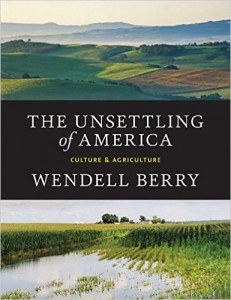 There’s a great quote from the The Unsettling of America: Culture & Agriculture by Wendell Berry where he says,
There’s a great quote from the The Unsettling of America: Culture & Agriculture by Wendell Berry where he says,
“The farm can exist only within the wilderness of mystery and natural force. And if the farm is to last and remain in health, the wilderness must survive within the farm. That is what agricultural fertility is, the survival of natural process and human order.”
When I think of organic gardening is about paying attention to the natural process. I think it’s about learning the names of things, or recognizing and respecting who we live among the plants, insects, rocks and rivers and the soil. I feel that I’m must a begnnier of that. There’s this book I am reading The Forest Unseen by David Haskill.
Where he writes about taking a small section of the forest in the shape of a mandela and studying it for a year. Down in Tennessee he’s a biologist and every day he observes then he writes a book about it. It’s just fascinating! There’s just so much to learn from our backyard to learn from nature it’s important that we retain a beginners mind, that we don’t just run out and make changes without thinking about the consequences. That’s what I think about what og/ef gardening means.
I like that! Before I started my podcast I had never heard of Wendell Berry, and for some reason I just read a whole bunch about him? I can’t remember if it was a website or what? I’m glad you brought that up. I think its a good time because with winter people are into reading gardening books right now.
Naturally Grown Certification
As far as certifications, we are certified naturally grown which is a grassroots alternative to certified organic. I sit on the board of directors for Certified Naturally Grown. It’s an organization that I believe in. Certified Naturally Grown assures that food is produced as such without synthetic chemicals or Genetically Modified Organisms. It has a unique peer review certification process that is affordable which is a big deal for small farmers like myself.
But more importantly being involved with Certified Naturally Grown has been an effective way for me to engage community members around growing healthy food and farming sustainably. It’s been an way for me to network with and learn from other farmers, and to teach interns and students and my CSA members not only about what my growing practices are, but also about why these practices are of value.
For example, maybe a year or two ago we were having an inspection here. There was a student who was volunteering, and she happened to be here during the inspection. One of the questions, they they just actually tell you to go out and tell you to dig for some earth worms because that is an indicator of healthy soil.
